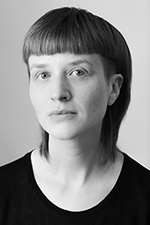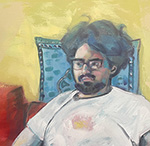 UVic work study student Ava Ugolini talks with the Long Poem Prize judge about collaborative work, editing as another form of reading, and how inspiration isn’t static.
UVic work study student Ava Ugolini talks with the Long Poem Prize judge about collaborative work, editing as another form of reading, and how inspiration isn’t static.
AU: What qualities are you looking for in a winning long poem?
KdP:
The winning long poem will articulate this to me and not the other way around. While no one can wholly switch off their inherent subjective preferences, I hope not to dictate what this poem will be, but rather to be surprised by the velocity of a work that pushes back against my expectations.
AU: You have collaborated with your Long Poem Prize co-judge Khashayar “Kess” Mohammadi which culminated in your co-authored book, G (2023). I know you used a shared Google document, but how was that process? What is the collaborative writing process for you two?
KdP:
Collaborating with Kess was amazing. We are very much on the same page when it comes to poetics, what we like and so on, and we admire and respect each other’s work. That made the collaboration easy because we could trust each other’s contributions to direct the larger project. I’ve spoken quite a bit elsewhere about composing G early during the COVID19 pandemic, so I’ll comment on our collaborative performances instead. We read sections from G in Ottawa, Toronto, and Vancouver, and did an entire read-through of the book in Montreal. The intimacy of sharing the stage, even the mic, with another poet is not something that you often experience with a solo collection. You get to fall into a cadence with the other voice and this can really differ from performance to performance. On different occasions, Kess and I read the same set of poems with energy and drive, and with a sense of steady melancholy. It’s beautiful and moving to be in sound together.
Read the rest of Klara du Plessis' interview.
Khashayar "Kess" Mohammadi,
Long Poem Prize co-judge
 UVic work study student and Fiction Editorial Board intern Star Kashi talks with the Long Poem Prize judge about introducing traditions, hyphenated identities, and speaking directly to the reader.
UVic work study student and Fiction Editorial Board intern Star Kashi talks with the Long Poem Prize judge about introducing traditions, hyphenated identities, and speaking directly to the reader.
SK: What makes a poem stand out to you? What will you look for in Long Poem Prize entries?
KM:
I like a poem that speaks to me directly and not to a larger audience. Let me clear that up: Y’know when you’re listening to the radio and the host says “How are you doing on the 405 today? How’s your commute?” This is a broadcast going to tens of thousands of people, but the announcer doesn’t say “How is everybody on the 405?” because they realize that even though this is going out to tens of thousands, every single person listens to it alone. I want a poem to single me out and speak to me as if I’m its sole audience. I want a poem that can carry me through my rainy commute on the 405.
SK: Poetry has always seemed boundless to me as it breaks the laws of literary traditions more than any other genre. You experiment with these boundaries in your book, G (Palimpsest, fall 2023), written in collaboration with Klara du Plessis (co-judge for the Long Poem Prize). What is your take on poetries that take a more orthodox or rather traditional route vs experimental poetry?
KM:
There are a few things to address here. Translingual poetics, of the likes of G, does not really break “traditional” poetry rules, rather it tries to introduce traditions to each other. “Experimental” poetry is always a subversion of the canon, and a canon is always created by political aims of a nation-state and the funds available to its arts sector to further its ethno-nationalist aims; therefore a “canon” is more often than not a colonial project. A “canon” against which experimental writing takes place is always within the borders of a state and its language(s). The importance of translingual poetics is not so much in breaking the poetic rules of one language, but to do away with the very deeply ingrained ideal that a poetics is dictated by a singular language (and its nation—although many nations share languages, their literatures follow different linguistic rules) and its symbolic system. Translingual poetics is a poetics that does not acquiesce to the very premise of “monolingual” writing and the proposed “nation” of its utopia. It considers the billions of people on this earth that live between language systems, either through hyphenated identities, immigration or living in cities where a half dozen or so languages are spoken daily. In the end, “traditional” and “experimental” poetry are mere labels for marketing and selling poetry, not for producing or consuming them.
Read the rest of Khashayar "Kess" Mohammadi's interview.